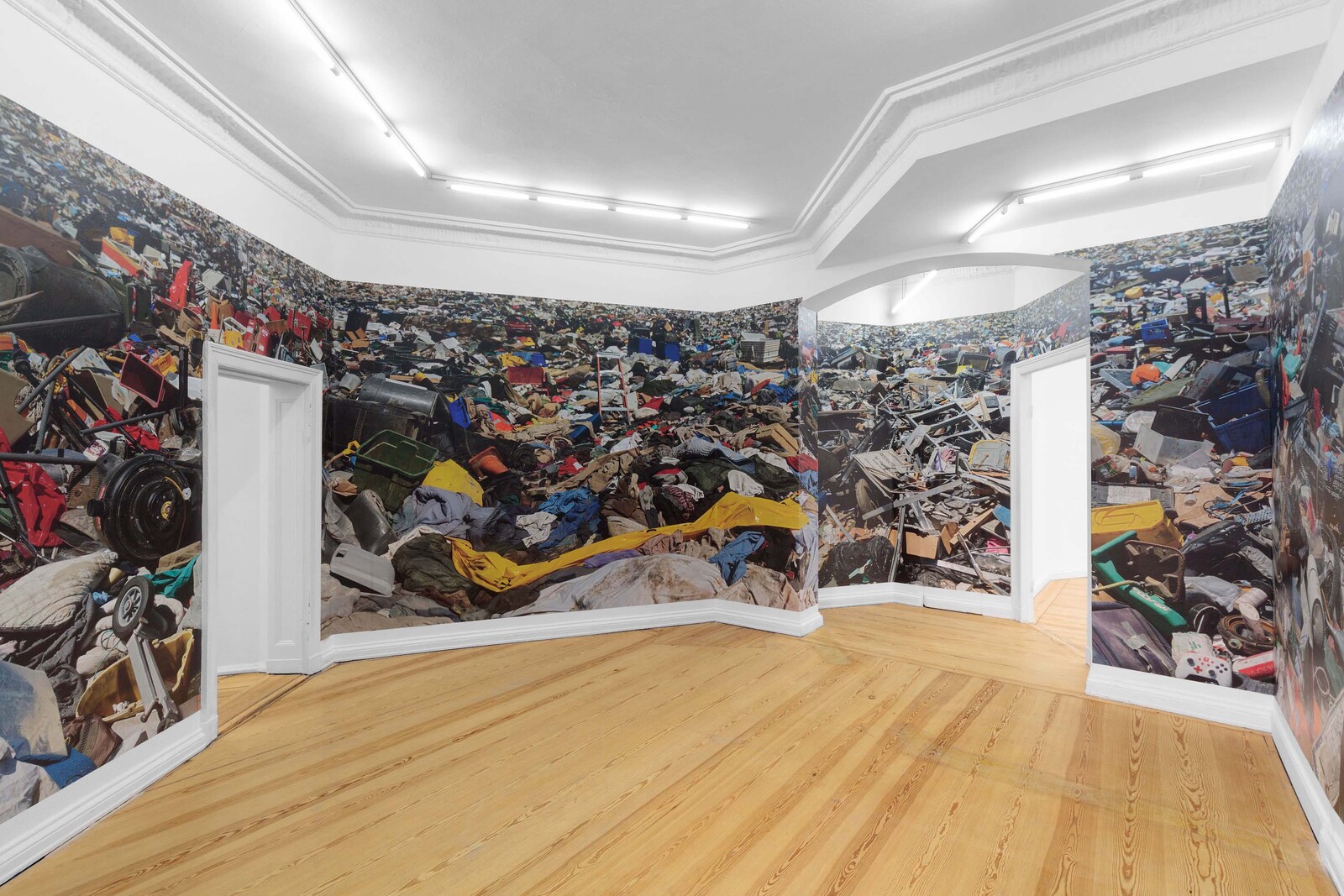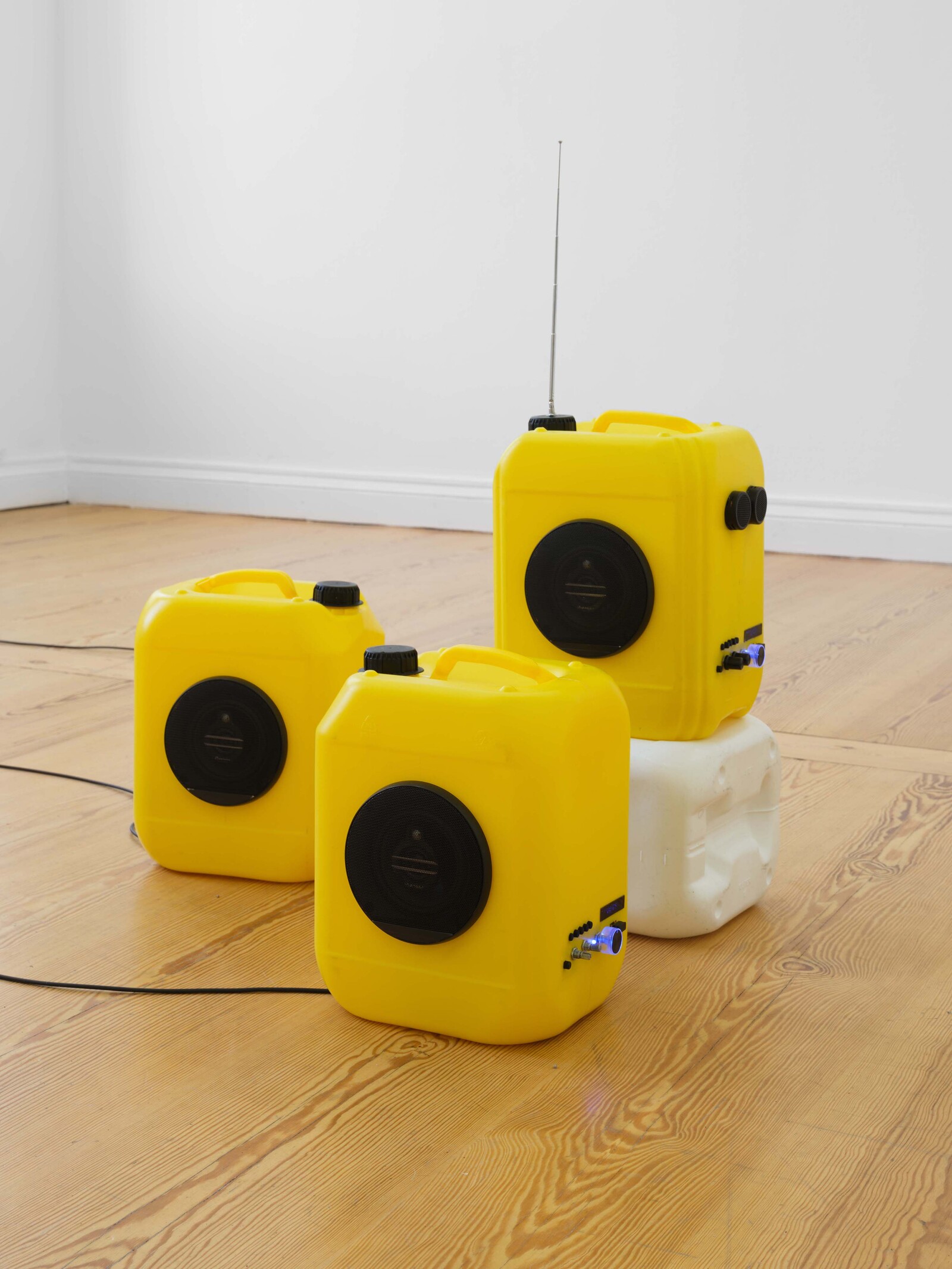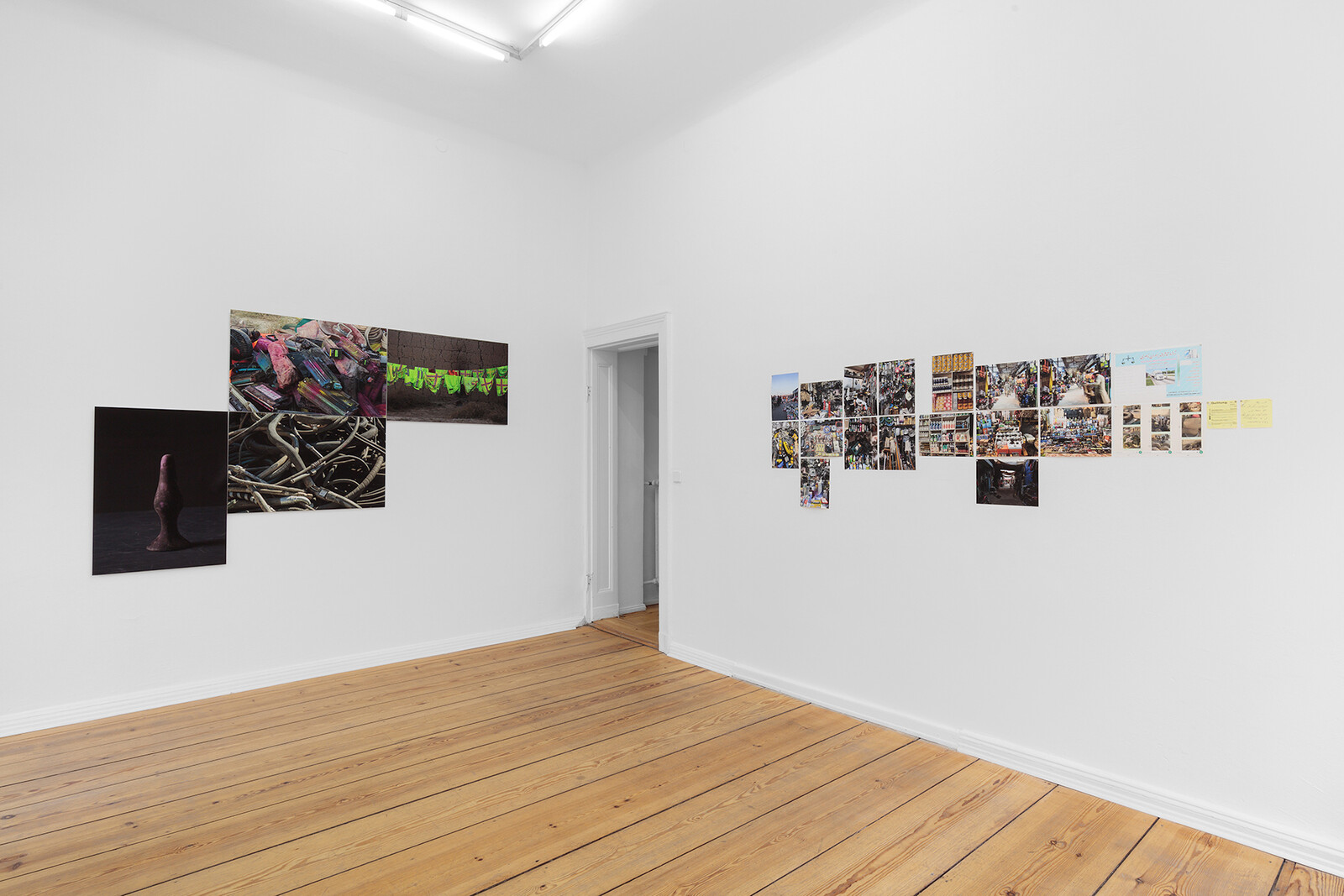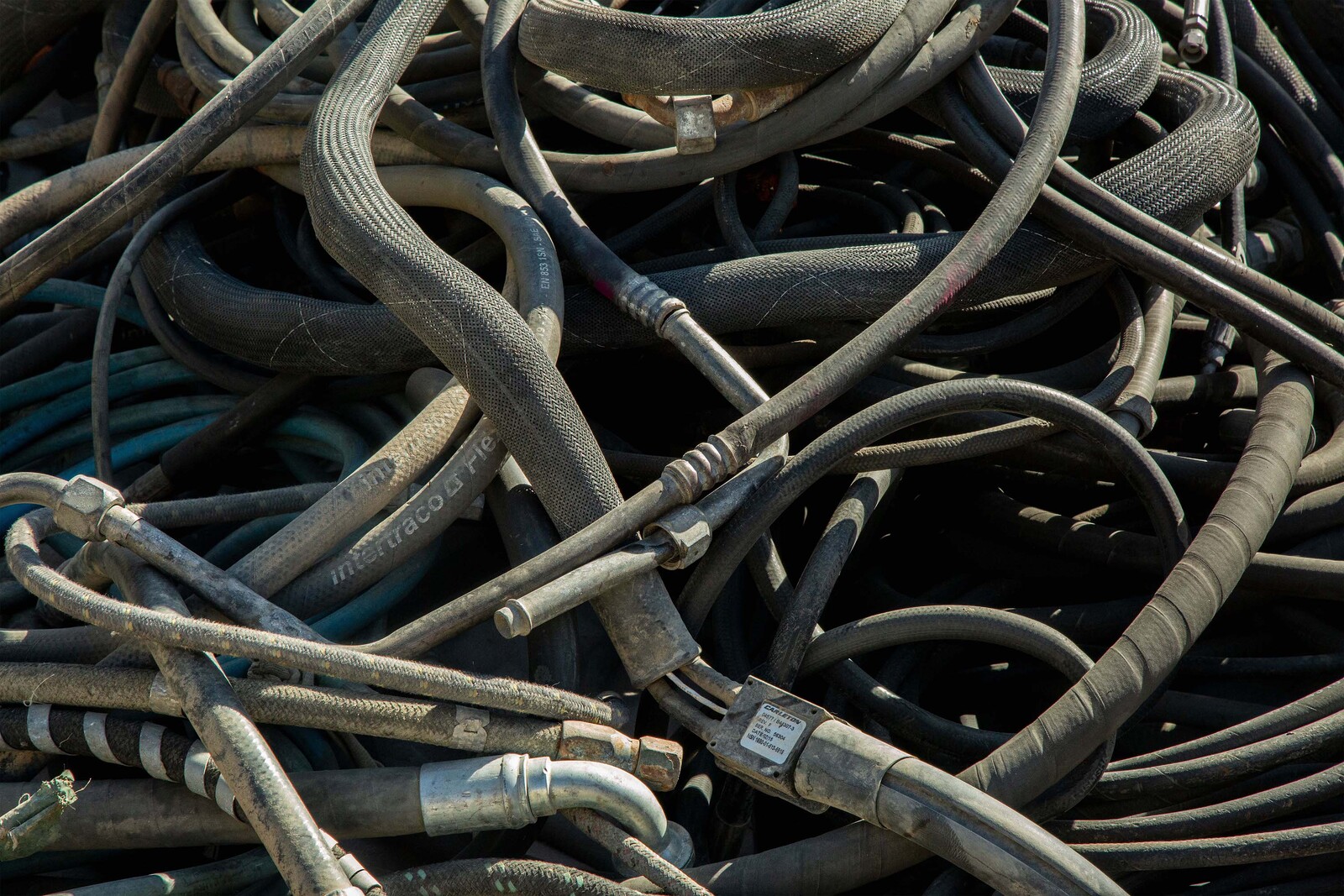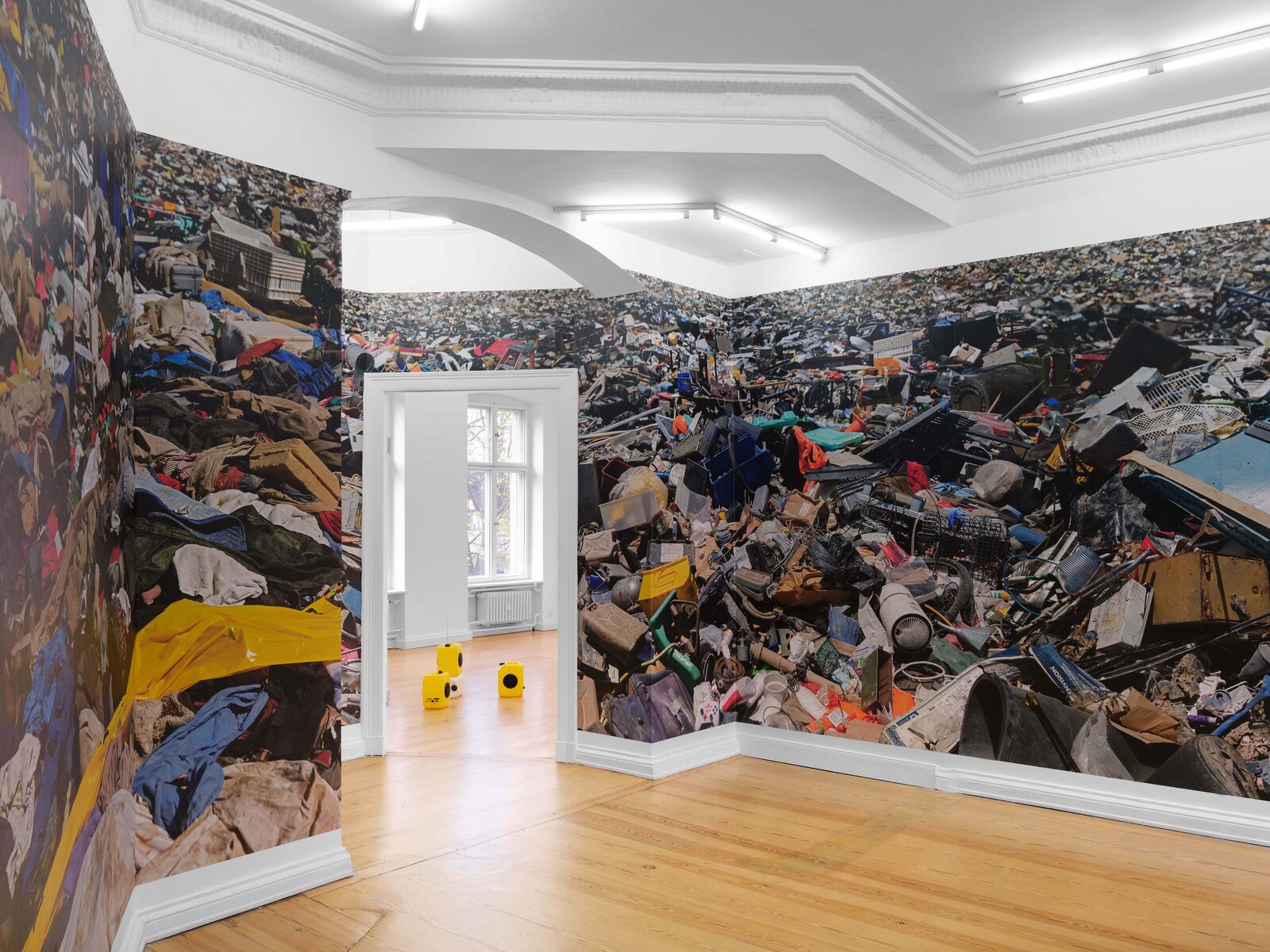“How then can we clean centuries’ worth of waste?” asks Françoise Vergès, reflecting on the devastation wrought by imperial conquests in the Global South.1 The question hangs over “No Dress Code,” artist Aziz Hazara’s affronting solo exhibition at Berlin’s PSM Gallery, which reflects upon the US military occupation of his native Afghanistan through the prism of trash.
Speakers housed in four modified, bright yellow–plastic jerrycans play soundscapes recorded by the artist over the past decade across Kabul. The title of this sound installation, Bushka Bazi (2023), is the Afghani name for these containers; together with the soundscapes, they conjure a distinct sense of place, but also of context. Introduced to the country through international aid cargos, they have been put to numerous uses since—from water carriers in peri-urban areas suffering from poor infrastructure to petrol-filled explosive devices used by the Taliban.
I am looking for you like a drone, my love (2021–22) is a large-scale photograph of colossal heaps of discarded material, sweepingly installed in a panoramic layout so as to cover the walls of the gallery’s central space. At first glance indistinguishable from the type of imagery disseminated by climate advocates to draw attention to environmental degradation, the panoramic photograph does not document a landfill, but rather the notorious Bagram Airfield, formerly the largest US military base in Afghanistan. On the night of July 1, 2021, American soldiers and personnel swiftly deserted the site without notifying Afghan forces, leaving most of their non-essential belongings—and other trash—behind. The crime that Hazara exposes is hence not one of unbridled consumption but of the imperial detritus that can render at one time occupied territories permanently uninhabitable. Direct yet evocative, I am looking articulates a powerful refutation of interventionism’s most domineering myth: its moral imperative to “civilize.”
The feeling of impotence provoked by the sheer scale of the trash mounds at Bagram Airfield carries through to the following room. Here, photographic prints and other paper-based materials of various sizes, which comprise the work Coming Home (2021–ongoing), are displayed in a disorganized manner, giving the impression that one is entering Hazara’s studio space. The piece is one of a three-part series stemming from a larger project, A gift to the American people, originally commissioned for the 58th Carnegie International, and aims to take stock of the artist’s attempt to ship 20 tons collected from Bagram Airfield to the US. This Sisyphean undertaking was rendered all the more impracticable by Hazara’s insistence that the shipment trace the exact sea and land routes Americans took to reach Afghanistan at the outset of the military occupation. The work appears to document both an artistic process and the material afterlives of the occupation.
Photographs of supermarket shelves in Kabul replete with American products appear alongside staged shots of a mortar shell and neon green safety vests hanging in the sun, while screenshots of WhatsApp exchanges and printed quotations offer insights into transportation costs, route comparisons, and other logistical considerations pertaining to the waste’s shipment. Together, they trace what the artist terms a “supply chain of the global war on terror.”2 This convergence of processes makes possible, on the one hand, the expendability of racialized life and, on the other, the boundless mobility of imported goods, aid packages, and weapons of war. The damning web that emerges through Hazara’s documentation of these objects and landscapes is reminiscent of Allan Sekula’s Fish Story (1995). In that work, seemingly standard photographs of harbors and port cities are counteracted with the artist’s critical referentiality to map complex transnational flows of goods, peoples, and jurisdictions.
For Hazara, waste is both material and metaphor. Like Vergès, he asks who is wrecking and who is cleaning, and in doing so demonstrates how vulnerability and immiseration are unevenly distributed on a global scale. In doing so, his work also gestures towards potential forms of self-determination, sketching out reparative blueprints for Afghanistan’s future generations. Militant in its combativeness yet mournful in its recognition of collective loss, Hazara’s work refuses to accept the inevitability of historical injustice.
Françoise Vergès, “On the Politics of Extraction, Exhaustion and Suffocation,” L’Internationale Online (November 8, 2021), https://www.internationaleonline.org/research/politics_of_life_and_death/195_on_the_politics_of_extraction_exhaustion_and_suffocation/.
See Alexandra Chaves, “Artist sends 20 tonnes of rubbish from Afghanistan to US as ‘gift to the American people’,” The National (February 2, 2022), https://www.thenationalnews.com/arts-culture/art/2022/02/02/artist-sends-20-tonnes-of-garbage-from-afghanistan-to-us-a-gift-to-the-american-people/.

